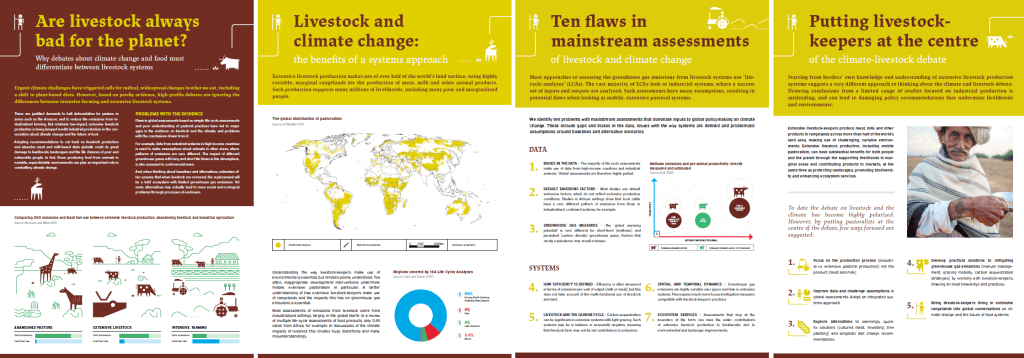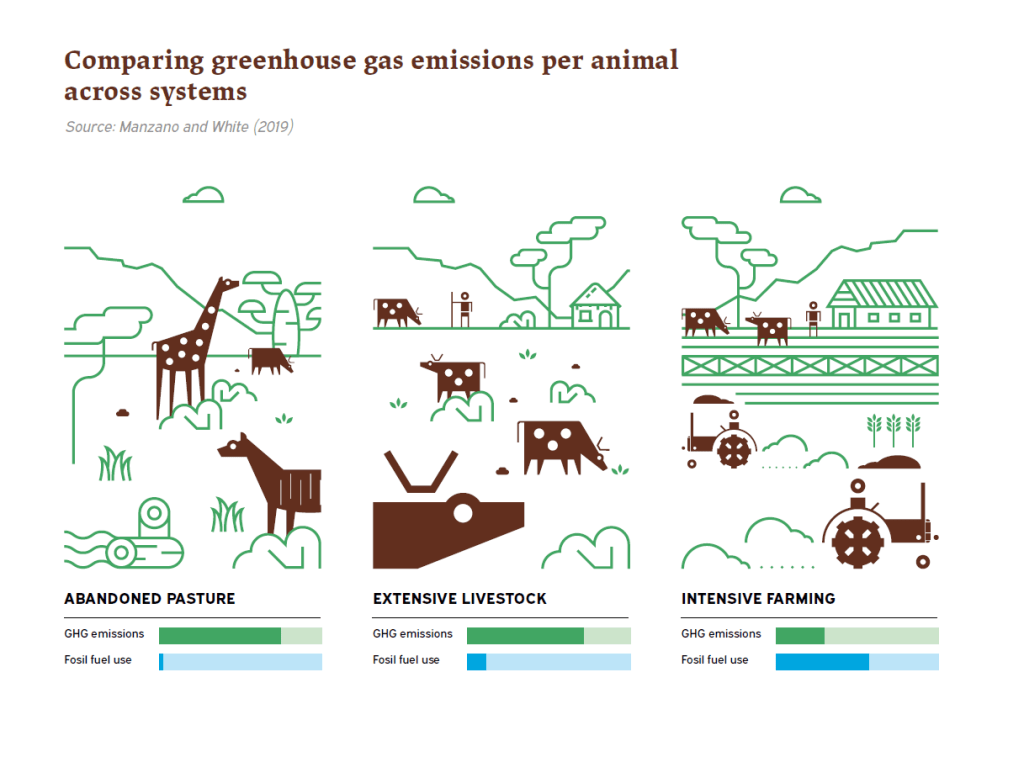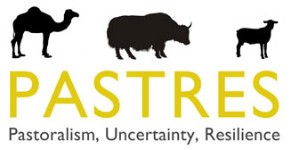A report and set of briefings warns that the dominant picture of livestock’s impacts on climate change has been distorted by faulty assumptions that focus on intensive, industrial farming in rich countries. Millions of people worldwide who depend on extensive livestock production, with relatively lower climate impacts, are being ignored by debates on the future of food.
Briefing and info sheets

- Briefing: Are livestock always bad for the planet?
- Info sheet 1: Livestock and climate change: the benefits of a systems approach
- Info sheet 2: Ten flaws in mainstream assessments of livestock and climate change
- Info sheet 3: Putting livestock-keepers at the centre of the climate-livestock debate
Other languages: To read the briefing and info sheets in Arabic, Dutch, French, Italian, Spanish, Turkish and Russian, see the end of this page.
Read the report

Cover photo: Nipun Prabhakar
Are livestock always bad for the planet? Rethinking the protein transition and climate change debate
by Ella Houzer and Ian Scoones
PASTRES, September 2021
The report identifies ten flaws in the way that livestock’s climate impacts have been assessed, and suggests how pastoralists could be better included in future debates about food and the climate.
The report is published by the European Research Council-supported PASTRES programme and 13 collaborating organisations (see below for details).
Download the report (PDF)Versions in other languages
Download the report in Mandarin Chinese.
Are livestock always bad for the planet? Chinese version (PDF)
Launch event
The report was launched at an online event on 27 September 2021. The event was a panel discussion and Q&A, chaired by Antonello Franca (Institute for Animal Production in the Mediterranean).
Speakers included Ian Scoones (PASTRES), Veronique Ancey (UN FAO), Fernando Garcia Dory (Rangelands Initiative/European Shepherds Network), Fiona Flintan (International Livestock Research Institute) and Engin Yılmaz (Alliance for Mediterranean Nature & Culture/Yolda Initiative). The event was held as part of the Italian government’s All4Climate series ahead of the COP26 pre-summit.
More about the report
Choices about food and land use are high-profile issues as the world’s leaders gather for the UN’s major annual climate conference (COP26) in November 2021.
The report argues that important decisions about climate mitigation, food systems and land use – including dietary shifts, tree planting schemes and rewilding – are being based on partial or misleading evidence. Changes in meat and milk consumption must focus on the most climate-damaging diets, which are concentrated among a ‘consumption elite’ – often rich people in rich countries.

Data from industrial systems in high-income countries are used to make assumptions about animals in other areas, where patterns of emissions are very different. Global studies of livestock emissions are skewed towards rich countries. This means that low-impact, extensive pastoral production, which often takes place in marginal or variable landscapes, has been ‘lumped in’ with much more intensive methods.
The impact of different greenhouse gases, with long and short lifetimes in the atmosphere, is also assessed and discussed in controversial ways – for example, treating cows and cars as equivalent sources of carbon emissions.
The report recommends several ways to include pastoralists in debates on the future of food and climate change. These include developing practical solutions to mitigating greenhouse gas emissions including manure management, grazing mobility and strategies for carbon sequestration. This means working with livestock-keepers, drawing on local knowledge and practices.
Collaborating organisations
The report is published by the ERC PASTRES project, in collaboration with the Alliance for Mediterranean Nature and Culture (AMNC), the Coalition of European Lobbies for Eastern African Pastoralism (CELEP), the Centre for Sustainable Development and Environment (CENESTA), the European Shepherds Network (ESN), the International Institute for Environment and Development (IIED), the International Livestock Research Institute (ILRI), the Italian Network on Pastoralism (APPIA), the League for Pastoral Peoples and Endogenous Livestock Development (LPP), the International Land Coalition’s Rangelands Initiative, the Spanish Platform for Extensive Livestock Systems and Pastoralism, Vétérinaires Sans Frontières (VSF) International, the World Alliance of Mobile Indigenous Peoples and Pastoralists (WAMIP) and the Yolda Initiative.
The report is published in support of the International Year of Rangelands and Pastoralists 2026.
Briefing and info sheets – translated versions
Read the briefing and info sheets in Arabic, Dutch, French, Italian, Spanish, Turkish or Russian. (Currently the full report is only available in English.)
Arabic
Briefing: Are livestock bad for the planet? (in Arabic)
- Info sheet 1: Livestock and climate change: the benefits of a systems approach (in Arabic)
- Info sheet 2: Ten flaws in mainstream assessments of livestock and climate change (in Arabic)
- Info sheet 3: Putting livestock-keepers at the centre of the climate-livestock debate (in Arabic)
Chinese
Briefing: Are livestock bad for the planet? (in Chinese)
Dutch
Briefing: Is veeteelt altijd slecht voor de planeet?
- Info sheet 1: Vee en klimaatverandering: de voordelen van systeembenadering
- Info sheet 2: Tien tekortkomingen in de gangbare kijk op veeteelt en klimaatverandering
- Info sheet 3: Veehouders centraal stellen in het debat over klimaat en veeteelt
French
Briefing: L’élevage est-il forcément néfaste pour la planète ?
- Info sheet 1: Élevage et changement climatique: les avantages d’une approche systémique
- Info sheet 2: Dix lacunes dans les études conventionnelles sur l’élevage et le changement climatique
- Info sheet 3: Placer les éleveurs pastoraux au coeur du débat sur le climat et l’élevage
Italian
Briefing: L’allevamento è necessariamente una minaccia per il pianeta?
- Info sheet 1: Allevamento e cambiamento climatico: i vantaggi di un approccio sistemico
- Info sheet 2: Dieci criticità rilevate nelle analisi tradizionali sulle relazioni tra allevamento e cambiamento climatico
- Info sheet 3: Porre i pastori al centro del dibattito sul clima e sull’allevamento
Russian
Briefing: Всегда ли животноводство вредно для планеты?
- Info sheet 1: Животноводство и изменение климата: преимущества системного подхода
- Info sheet 2: Десять недостатков в основных оценках животноводства и изменения климата
- Info sheet 3: Ставить животноводов в центр дебатов о климате и животноводстве
Spanish
Briefing: La ganadería, ¿es siempre mala para el planeta?
- Info sheet 1: Ganadería y cambio climático: los beneficios de un enfoque sistémico
- Info sheet 2: Diez errores de las evaluaciones generalistas sobre la ganadería y el cambio climático
- Info sheet 3: Situar a los ganaderos en el centro del debate sobre clima y ganadería
Turkish
Briefing: Hayvancılık gezegenimiz için her zaman kötü mü?
- Info sheet 1: Geleneksel Hayvancılık ve iklim değişikliği: sistem yaklaşımının faydaları
- Info sheet 2: Hayvancılık ve iklim değişikliğine dair ana akım değerlendirmelerdeki on kusur
- Info sheet 3: Geleneksel hayvancıların iklimhayvancılık tartışmasının merkezine koyulması
Related publications
Livestock, methane, and climate change: The politics of global assessments
by Ian Scoones
WIRES Climate Change, May 2022
Livestock and Climate Justice: Challenging Mainstream Policy Narratives
By Fernando García-Dory, Ella Houzer and Ian Scoones
IDS Bulletin on Reframing Climate and Environmental Justice, 2021
